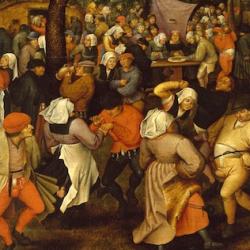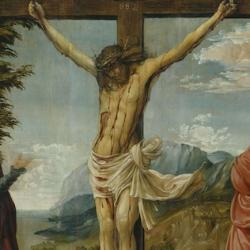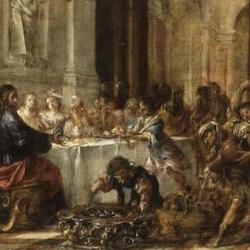John 20:28: Thomas answered and said to Him, My Lord and my God.
Let us pray.
Father, You raised Your Son Jesus from the dead to bring a new day. Strengthen our faith by Your Spirit, so that we may believe the things written and so participate more and more in the power of His indestructible life and ascend to be with Him where He is, through the same Jesus Christ our Lord. Amen.
An octave is a repetition, a repetition with a difference. It’s not the first note played again, but the first note played at a higher pitch. Octaves have always marked new beginnings. Hebrew boys were circumcised on the eighth day. Firstborn sheep were dedicated to Yahweh on the eighth day. Aaron entered the priesthood on the eighth day. Lepers, men with discharges, women with flows of blood were cleansed on the eighth day. The temple dedication climaxed with a solemn assembly on the eighth day.
Easter is itself an octave, an eighth. Jesus rose on the day after the Sabbath, after Israel’s week ended. Easter is a repetition of all the eights of the Old creation, but transcends all those partial new beginnings by taking them an octave higher. Yet, this evening we’re celebrating the octave of Easter, the evening of the eighth day after the eighth day. We have moved up another octave. If we’ve already celebrated the beginning of a new week, why do we need a second eighth day?
In some Christian traditions, the octave of Easter is the feast of St. Thomas, and that’s because Jesus appears to Thomas on the eighth day after Easter. Thomas, famously, comes to faith slowly, but so does everyone else. Peter and the Beloved Disciple enter the tomb on Easter, but neither of them understands that Jesus had to rise from the dead and neither speaks to Jesus until He meets them later for a seaside breakfast. Mary stays at the tomb weeping after the disciples leave, but she at first mistakes Jesus for the gardener. Even after the disciples hear Mary’s Easter announcement “I have seen the Lord,” they stay locked in a room hiding from the Jews. All the disciples, not just Thomas, struggle to believe the news too glad to be true.
What makes Thomas unique is the fact that he doesn’t see Jesus on Easter, the first eighth day. He sees Jesus eight days later. Yet Thomas is the first to acknowledge Jesus for who He is. Criticize Thomas if you must, but he confesses Jesus before Peter or John do. Thomas sees Jesus’ wounds and falls in worship, for the wounds prove that Jesus is “My Lord and my God.”
John 20 moves from Mary and the apostles who see Jesus on Easter to Thomas who sees Jesus after eight days, but at the end of the chapter John tells us he’s writing to us who have never seen Jesus at all. Thomas’ encounter with Jesus on the octave of Easter assures us that the new life of the eighth day is not limited to those few who see Jesus on Easter. Our distance from the event does not exclude us from resurrection life. On the contrary: Thomas is the first of the Twelve to enter fully into Easter faith, the first fully to grasp the new beginning of Easter, even though he doesn’t see Jesus until the second octave. After the octave that is Easter, after the octave of Easter, after two millennia or five or ten, we can still know that “Jesus is the Christ the Son of God” and by believing we can still learn to sing Easter’s octave and enter the abundant life of the eighth day.
In the Name of the Father, and of the Son, and of the Holy Spirit. Amen.
Let us pray.
Lord Jesus, our Lord and our God, You revealed Yourself to Thomas on the eighth day after Your resurrection by showing Him your wounds in your hands and side. Put our doubts to rest, so that we may be blessed as those who have not seen, but yet have believed. Amen.











